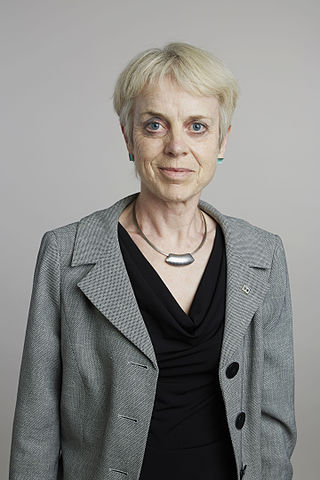
Pharmacology is the science of drugs and medications, including a substance's origin, composition, pharmacokinetics, pharmacodynamics, therapeutic use, and toxicology. More specifically, it is the study of the interactions that occur between a living organism and chemicals that affect normal or abnormal biochemical function. If substances have medicinal properties, they are considered pharmaceuticals.

The GABA receptors are a class of receptors that respond to the neurotransmitter gamma-aminobutyric acid (GABA), the chief inhibitory compound in the mature vertebrate central nervous system. There are two classes of GABA receptors: GABAA and GABAB. GABAA receptors are ligand-gated ion channels ; whereas GABAB receptors are G protein-coupled receptors, also called metabotropic receptors.
GABAB receptors (GABABR) are G-protein coupled receptors for gamma-aminobutyric acid (GABA), therefore making them metabotropic receptors, that are linked via G-proteins to potassium channels. The changing potassium concentrations hyperpolarize the cell at the end of an action potential. The reversal potential of the GABAB-mediated IPSP is −100 mV, which is much more hyperpolarized than the GABAA IPSP. GABAB receptors are found in the central nervous system and the autonomic division of the peripheral nervous system.
The International Union of Basic and Clinical Pharmacology (IUPHAR) is a voluntary, non-profit association representing the interests of scientists in pharmacology-related fields to facilitate Better Medicines through Global Education and Research around the world.

Richard Henderson is a British molecular biologist and biophysicist and pioneer in the field of electron microscopy of biological molecules. Henderson shared the Nobel Prize in Chemistry in 2017 with Jacques Dubochet and Joachim Frank. "Thanks to his work, we can look at individual atoms of living nature, thanks to cryo-electron microscopes we can see details without destroying samples, and for this he won the Nobel Prize in Chemistry."

CGP-7930 was the first positive allosteric modulator of GABAB receptors described in literature. CGP7930 is also a GABAA receptor positive allosteric modulator and a blocker of Potassium channels.

Stuart Graham Cull-Candy is a British neuroscientist. He holds the Gaddum Chair of Pharmacology and a personal Chair in Neuroscience at University College London. He is also a member of the Faculty of 1000 and held a Royal Society - Wolfson Research position.

Paul Workman is a British scientist noted for his work on the discovery and development of pharmaceutical agents in the field of oncology. He is President and CEO of The Institute of Cancer Research In London.
Ann Jacqueline Hunter CBE FMedSci FBPharmacolS FRSB is a British scientist who is a board director of BenevolentAI. Hunter is also a visiting professor at St George's Hospital Medical School and Imperial College. She is Chair of the Trustees of the Sainsbury Laboratories at Norwich, chair of the board of the Stevenage Bioscience Catalyst and chair of the board of Brainomix. She was previously CEO of the Biotechnology and Biological Sciences Research Council.
Sheena Elizabeth Radford is a British biophysicist, and Astbury Professor of Biophysics and a Royal Society Research Professor in the Astbury Centre for Structural Molecular Biology, School of Molecular and Cellular Biology at the University of Leeds. Radford is the Associate Editor of the Journal of Molecular Biology.
Arthur Christopoulos is an Australian Professor of Analytical Pharmacology at Monash University. He was a Councillor of the International Union of Basic and Clinical Pharmacology from 2018 to 2022. In 2019 he was appointed Dean of Monash University's Faculty of Pharmacy and Pharmaceutical Sciences and from 2021 to 2023 he served as the inaugural Director of Monash University's Neuromedicines Discovery Centre. He was elected a Fellow of the Australian Academy of Science in 2021.

Annette Catherine Dolphin is a British scientist who is Professor of Pharmacology in the Department of Neuroscience, Physiology and Pharmacology at University College London (UCL).

Antony Giuseppe Galione is a British pharmacologist. He is a professor and Wellcome Trust senior investigator in the Department of Pharmacology at the University of Oxford.

David Lodge is a research fellow in the Department of Physiology and Pharmacology at the University of Bristol.
Professor Norman Bowery, was a British pharmacologist and former Head of Division of Neuroscience and Chair of Pharmacology at the University of Birmingham from 1995 to 2004. He was president of the British Pharmacological Society from 1995 to 1997 and from 1999 to 2000.

Christopher G. TateFRS is an English membrane protein biochemist and molecular biologist who works at the Medical Research Council Laboratory of Molecular Biology in Cambridge, UK. Tate is known for his contributions to the understanding of G protein-coupled receptors.

3-Aminopropylphosphinic acid, also known in the literature as 3-APPA or CGP 27492, is a compound used in scientific research which acts as an agonist at the GABAB receptor. It is part of a class of phosphinic acid GABAB agonists, which also includes SKF-97,541. It has a binding affinity (pKi) to the GABAB receptor of 8.30.
Frances Mary Platt is a British biochemist and pharmacologist who is a professor at the University of Oxford. Her research investigates rare genetic disorders known as lysosomal storage diseases, progressive conditions that lead to neurodegeneration. She was elected Fellow of the Royal Society in 2021.
Clare Bryant FLSW is a British veterinary scientist and clinical pharmacologist who is a professor at the University of Cambridge. She specialises in innate immunity. Bryant is a Fellow of Queens' College, Cambridge and of the British Pharmacological Society.
Arthur Henry Weston is emeritus professor at the University of Manchester, where he was previously Leech Professor of Pharmacology from 1989-2011.











